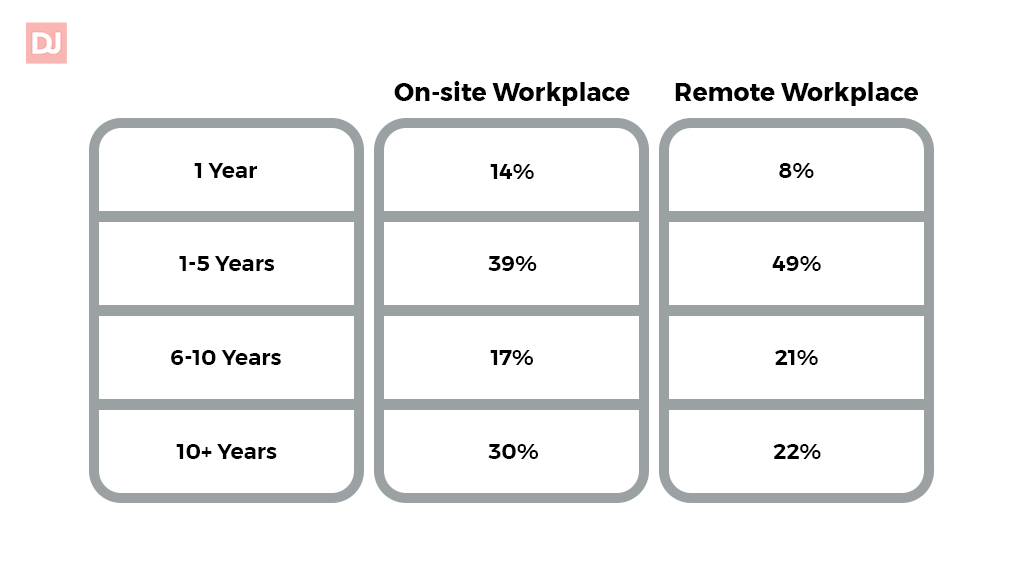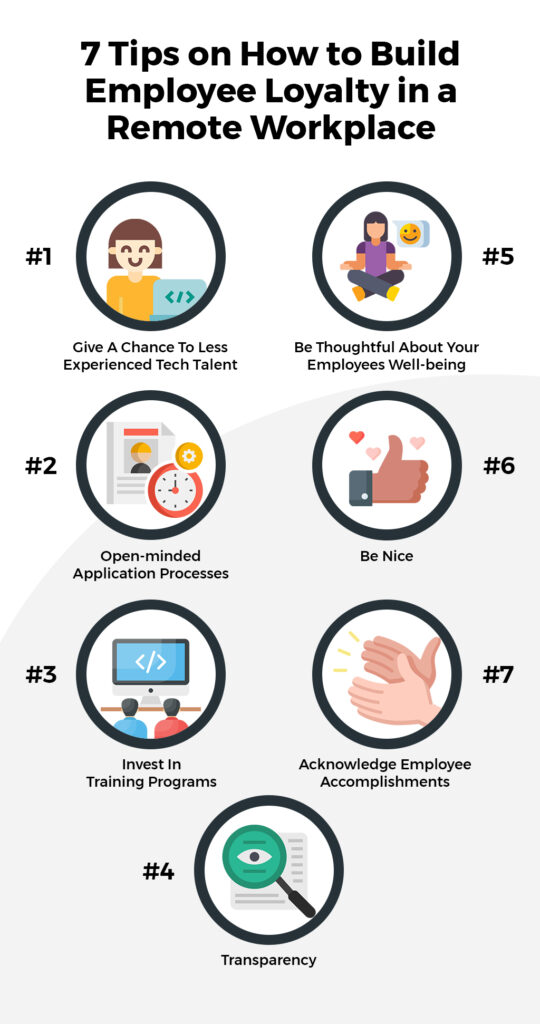Have you ever heard of the ‘war of talent’ concept? Steven Hankin of McKinsey & Company coined the term in 1997. And, in 2001, Ed Michaels, Helen Handfield-Jones, and Beth Axelrod used the term to describe the increasingly competitive US and EU landscape for recruiting and retaining talented employees. In the book, authors don’t refer only to Human Resources processes. They focus on a mindset that emphasizes the importance of creating loyalty in the workplace to retain talent. How can you retain talent, especially when it comes to tech talent? We wrote actually an entire article that will serve you as a guide on how to retain software developers in your startup.
Team members’ loyalty is one of the core elements of a company’s long-term success, especially when it comes to dev teams. Overlooking your remote developer team’s commitment is not a rare mistake. Neglecting to account for loyalty and how it affects employees’ morale can cost you valuable talent. Even worse, it can do so on short notice and leave you in a tight spot. Some simple – but essential – practices can help managers inspire remote developers’ loyalty.
What Is Loyalty In A Remote WorkPlace?
Employees’ loyalty in the workplace happens when team members feel that contributing to a company’s success is in their best interest. Indeed, employee loyalty and commitment is a two-way street. Team members will be as loyal to you as they think you are to them – in both small and large companies.
When working in a distributed team, there is a deep connection between remote work and loyalty in work ethics. Compared to on-site workplaces, the Owl Lab’s 2019 State of Remote Work report found:

It isn’t a secret that, today, most people prefer to work remotely. However, these data show that by building trust and loyalty, people tend to stay longer in their companies reducing the risk of employees’ turnover.
Why is Loyalty In The Remote Workplace Important For Developers?
Trust and loyalty in the workplace are as relevant to remote developers as they are to any workforce. In virtual teams, most developers will always keep an eye out for better opportunities. A disloyal worker wouldn’t bat an eye about leaving you in the middle of important business. As a result, they would damage your company’s operation, financial status, and customer satisfaction rates. On the contrary, a loyal remote team will bring such unexpected situations to a minimum.
However, loyalty isn’t only about retaining talent forever but also about remote developers’ performance. Work arrangements with remote team members tend to be more flexible. In this case, a lack of loyalty can result in missed deadlines. Disloyal employees are only concerned with hitting your targets to the extent it gets them paid. Remote workers’ performance is proportional to their motivation and loyalty. And remote developers’ performance, respectively, is commensurate with customer satisfaction.
In addition, another risk coming from the lack of loyalty relates to your clients. Disloyal remote employees might try to take clients or undermine your image. Ex-remote workers can copy your company’s ideas and bring them somewhere else. They might start looking for ways to benefit from you without contributing. The best way to prevent this is by showing loyalty to your remote workforce in the first place.
Benefits of Having Loyal Employees in the Remote Workplace
- Productivity
- Happiness
- Inclusion
- Cost savings
1. Productivity
According to a Stanford study, remote workers work longer hours and are more productive. If remote work arrangements allow more flexibility, building trust increases their productivity and performance.
2. Happiness
A Flexjobs survey found that 88% of the respondents prefer WFH positions to have more time with their families. However, if you micromanage them, you will undermine the positive impact of this flexibility. As we mentioned, honesty and loyalty in the workplace is a two-way street. If you leave your team members in control of their lives and able to focus on their families, they will be loyal to your company and more productive.
3. Inclusion
A Clutch.co survey found 23% of managers saying that diversity and inclusion improve team dynamics and satisfaction. After protests like Black Lives Matter and Me Too, diversity and inclusion are key strategies to create a loyal workplace, leading to more inclusive and productive teamwork.
4. Cost savings
Last but not least, a loyal workplace means reducing the risks of employee turnover. Training and hiring processes highly impact businesses’ budgets. Implementing your strategies to stimulate trust and loyalty helps you save money and maintain running project continuity.
7 Tips on How to Build Employee Loyalty in a Remote Workplace
If remote work arrangements can support you in creating a positive workplace, what makes an employee loyal to a company requires strategies and constant effort on your side. Here are 7 practical tips for developing trust and loyalty in the workplace:

1. Give A Chance To Less Experienced Tech Talent
Most managers put experience above all. This requirement has created a catch-22 for many young and hungry talent waiting for a chance to prove their worth. Presenting eager remote employees with an opportunity to shine is like a binding spell. Recruiting talent that has everything to gain means building loyalty. Believing in one’s yet unproven abilities will form a loyalty bond that will last for a long time. You will go from being a manager to being a leader with loyal followers.
2. Open-minded Application Processes
Accommodate application processes that level the playing field. Ones that let potential employees compete with skills rather than on-paper experience. Recruiting talent through tasks that reveal qualities you consider important is how to value people through their performance. They will feel the spot is meant for them. Team members will perceive your company as more than a job forming an emotional attachment. Simply because you will be their coach and leader, trusting your direction and opinions.
Naturally, you can’t build a remote workforce solely for inexperienced workers. Devising a balanced strategy is key. Have more experienced and proved “veterans” oversee young talent. Create an open culture that encourages mutual learning. A setup like this is one of the best working conditions for building loyalty.
3. Invest In Training Programs
Constructing training programs is an excellent strategy to create loyalty in the workplace. Remote employees see growth opportunities as a powerful job perk. It’s also hard to be disloyal to someone who has invested time in you and your future. When you train remote developers, it reinforces your belief in their potential. It also increases their marketability for future employment. When that time comes, those employees won’t just abandon the ship without leaving on good terms. Training programs are one of the most effective ways of building loyalty.
4. Transparency
Being transparent about every aspect of the job is tightly entwined with loyalty. If you want a loyal remote workforce, you need to communicate effectively, starting from the job description. Whatever your offer might be – good or bad – being honest and upfront about the job details is essential. You can’t have loyalty without trust. When remote developers feel deceived, they will leave you the first chance they get. Hiding even minor details will end up costing you more in the long run.
5. Be Thoughtful About Your Employees Well-being
You can do little things that can go a long way towards building loyalty, especially financially. It doesn’t mean you have to give out bonuses or turn remote employees into charity cases.
Let’s say they encounter unforeseen circumstances preventing them from work. Health issues, for instance. Here are some examples of increasing loyalty in the workplace:
- Pay employees full salary when they need to take time off due to their health.
- Pay a small bonus before their holidays to help them get the most out of their time off.
- Pre-paying their salary in case of emergencies.
Such gestures of kindness are hard to forget and make a big difference. Working conditions that build loyalty often revolve around simple, human acts. They work as a vote of confidence and showing concern about remote employees’ well-being builds loyalty. On the contrary, cutting back costs to the extent of limiting working conditions and potential can quickly ruin it.
6. Be Nice
Being nice is a cliché – and for some people, it even sounds like an insult. However, being nice can make all the difference to your remote developers’ loyalty.
When you communicate, in whatever form, be nice and communicate effectively. Don’t talk down to your remote dev team. Be firm, but not overly bossy. Say thank you. Show that you recognize their input. If you don’t, they give them polite pointers on how they can improve. Feeling valued is practically loyalty’s first cousin.
Seeing the growth potential is the second. Think about how you would talk to your superior. That’s exactly how you should talk to those below you on the company ladder, as well. The only difference is: you are the one running the show. How you run it, though, is entirely up to you. Find the happy medium between being a leader and being nice, and you’ll find loyalty too.
7. Acknowledge Employee Accomplishments
Finally, it is fundamental to acknowledge team members’ accomplishments. Being appreciated feels good, but it isn’t the only reason why it is important. In the long run, if you don’t recognize developers’ effort, they will lose trust in your ability to overlook the team performance as a manager. Over time, they will stop putting effort into their tasks because they won’t see the point in improving their performance for someone who doesn’t even know their workload.
Recognizing and valuing time, effort, and skills at work are valued for each employee is crucial to create a relationship based on trust and loyalty.
Last Strategy: Hire The Right Candidates
Building loyalty is as delicate as it is crucial. Different managers use different approaches to earning their team’s loyalty. However, you can’t skip finding good strategies if you want to build a dynamic and productive team. People won’t ever give you their best results if they don’t feel connected with you and the company.
Remember, to create this connection leading to trust and loyalty, the first step is hiring valuable candidates. Analyze your team members and make sure to hire types of personalities that can work well together and with your schedule. Finding remote developers whose loyalty is worth having is our domain. But organizing the most efficient hiring process, that’s our winning card. So, if you need support and advice during the hiring process, get in touch with DistantJob!




